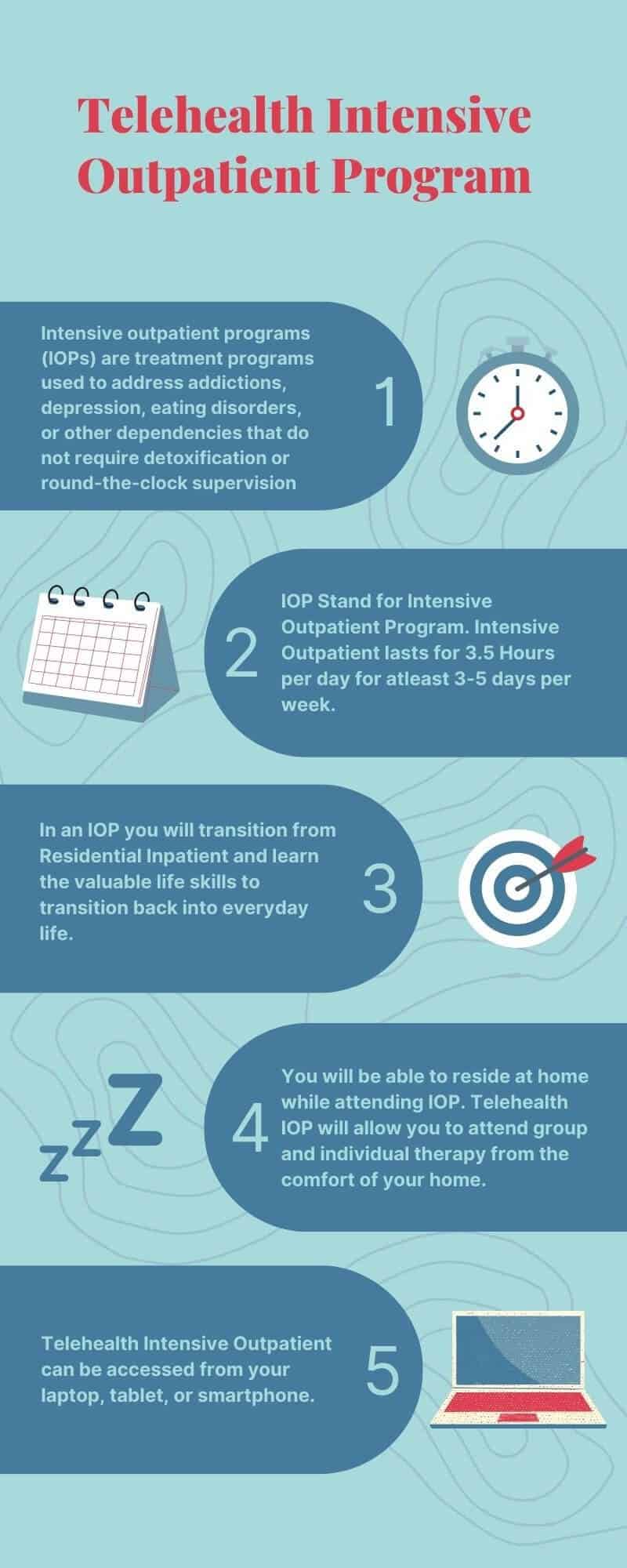The Benefits of Intensive Outpatient Program (IOP) for Long-Term Wellness.
The Benefits of Intensive Outpatient Program (IOP) for Long-Term Wellness.
Blog Article
Navigating the Complexities of Dual Diagnosis Therapy Within an Extensive Outpatient Program Establishing
In the realm of mental health and wellness and addiction therapy, the crossway of dual diagnosis provides a nuanced challenge that demands an extensive and customized approach. By discovering the intricacies of twin medical diagnosis therapy within this extensive outpatient context, a clearer path emerges towards holistic and sustainable recuperation for those grappling with these linked obstacles.
Dual Medical Diagnosis Overview

Comprehending twin diagnosis is vital as it calls for a detailed and incorporated technique to therapy. By acknowledging the interplay between material usage and psychological health and wellness, healthcare carriers can tailor interventions to meet the one-of-a-kind needs of each person. This alternative technique not just addresses signs and symptoms however additionally targets hidden variables that contribute to the twin medical diagnosis.
Moreover, untreated double medical diagnosis can bring about a cycle of regression and getting worse mental health and wellness signs and symptoms. By recognizing the intricacy of dual medical diagnosis and supplying specific care, healthcare specialists can support people in accomplishing long-lasting recuperation and boosted psychological wellness.
Tailored Therapy Strategies
Acknowledging the complex interplay between substance use disorders and mental health and wellness conditions, the development of customized therapy strategies is vital in dealing with the intricacies of dual diagnosis in psychological wellness therapy. Tailored therapy strategies are customized approaches that think about the distinct needs, difficulties, and objectives of individuals encountering dual medical diagnosis. These strategies are developed collaboratively by a multidisciplinary team of experts, including psychiatrists, psychologists, social employees, and addiction experts, to make sure thorough and incorporated care.
Tailored treatment strategies generally involve a combination of treatments, medicines, and behavior interventions that target both the material usage disorder and the psychological health condition concurrently. These strategies might consist of cognitive-behavioral treatment, dialectical actions therapy, medication-assisted treatment, private therapy, team therapy, and family members therapy, among various other evidence-based interventions. By tailoring treatment approaches to private conditions, tailored strategies can address the root triggers of twin medical diagnosis, promote long-lasting recovery, and improve total lifestyle for people fighting with co-occurring disorders.
Integrated Treatment Technique
An integrated treatment technique in dual medical diagnosis treatment combines medical, psychological, and social treatments to resolve the complicated needs of individuals with co-occurring material use conditions and psychological health problems. This technique identifies that dealing with one element of a double diagnosis without dealing with the other can result in inadequate outcomes. By incorporating clinical interventions such as drug management for psychological health problems with psychological treatments like cognitive-behavioral therapy for material use conditions, people obtain comprehensive care that targets all aspects of their dual diagnosis.
Additionally, the social facet of integrated care involves attending to ecological elements that may add to the growth or perpetuation of substance use and psychological health problems. This can consist of family dynamics, housing instability, or lack of social support. By integrating social treatments like family members treatment, occupation support, and area sources, the therapy ends up being more holistic and tailored to the individual's particular needs. In general, an integrated care approach in twin diagnosis therapy within an intensive outpatient program setting intends to give comprehensive, reliable, and personalized treatment to people dealing with co-occurring disorders.
Challenges in IOP Establishing
In the context of double medical diagnosis therapy within an intensive outpatient program, browsing the intricacies of co-occurring substance usage disorders and psychological health and wellness problems presents substantial challenges. Among the primary hurdles in the IOP setup is the control of treatment in between psychological health professionals and drug abuse specialists to make certain an extensive therapy approach. This needs effective interaction, collaboration, and a deep understanding of exactly how these conditions engage and affect each various other.

Additionally, dealing with preconception and resistance to therapy within the IOP setting can impede progression. Some individuals might be reluctant to reveal their dual diagnosis or might really feel ashamed, hindering their engagement in the therapeutic procedure. Overcoming these barriers demands a supportive and non-judgmental atmosphere that fosters trust fund and visibility.

Collaborative Specialist Initiatives
Effective double medical diagnosis treatment in an intensive outpatient program necessitates smooth cooperation among psychological wellness specialists and material misuse professionals to ensure a thorough and incorporated approach to care. By working together, these experts can produce individualized therapy plans that cater to the distinct requirements of each individual, considering both their psychological health and compound abuse difficulties.
Collective efforts likewise encompass routine communication and information sharing amongst employee to ensure a natural treatment technique. This might involve case conferences, joint sessions with the person, or shared documents to track development and readjust treatment strategies as required. Additionally, collaboration may consist of involving other medical care professionals such as health care physicians or household therapists to supply holistic support to the individual. Inevitably, an unified front Full Article of specialists interacting enhances the effectiveness of twin diagnosis therapy within an extensive outpatient program.
Conclusion
In verdict, efficient twin diagnosis therapy within an intensive outpatient program setup needs tailored treatment plans and an integrated treatment method. Challenges may occur in this setup, however joint initiatives amongst experts can aid navigate these complexities. By resolving the unique demands of people with co-occurring mental health and substance make use of conditions, IOP programs can provide extensive and all natural treatment to sustain recovery and total health.
Report this page